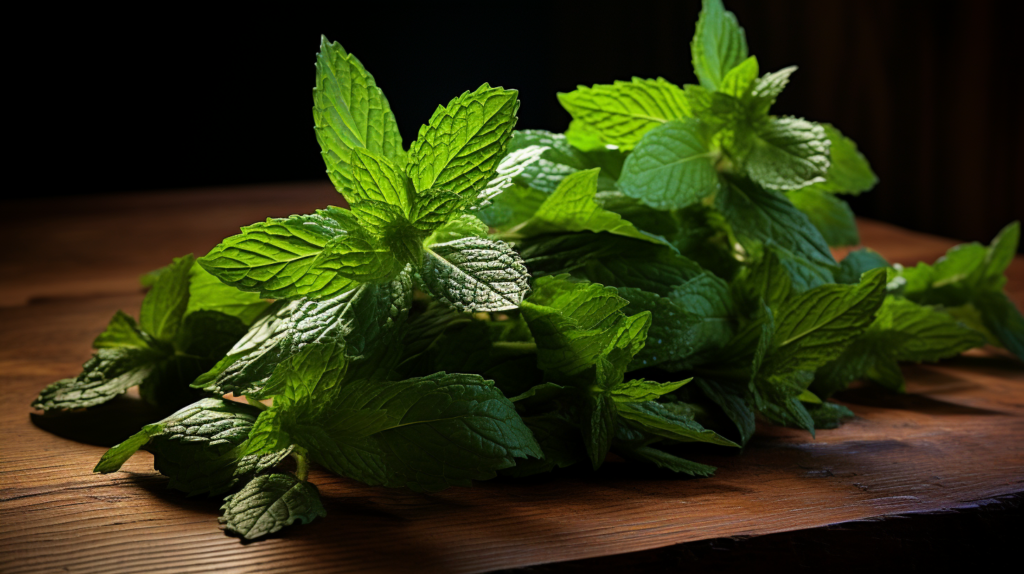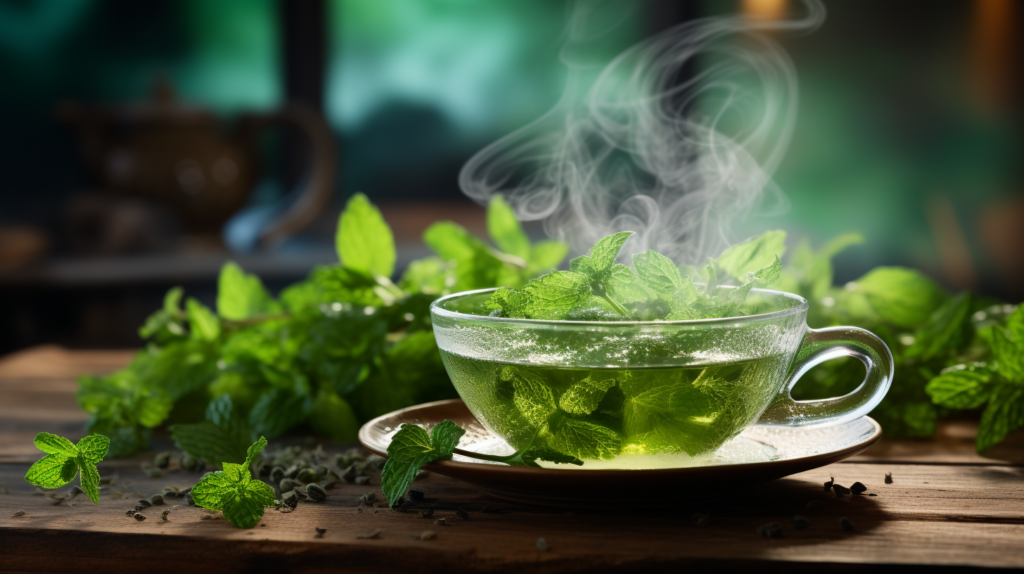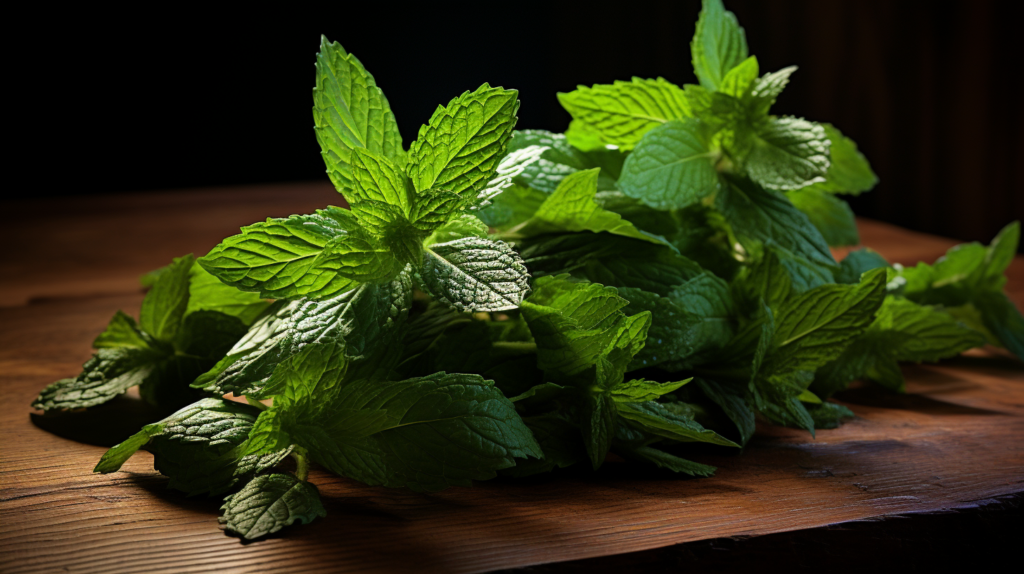Peppermint is a versatile herb that has been used for centuries for its medicinal properties. From treating digestive issues to relieving headaches, peppermint is a go-to herbal remedy for many ailments.
One of the most well-known peppermint health benefits is its ability to soothe indigestion and headaches naturally. In this article, we will explore the various health benefits of peppermint and how it can improve your overall well-being.
Key Takeaways:
- Peppermint is a versatile herb with a variety of medicinal uses.
- Peppermint can naturally soothe indigestion and headaches.
- Peppermint can be consumed as tea, applied topically, or used in essential oil form.
- Peppermint can also promote respiratory health, alleviate pain, and reduce stress levels.

Understanding Peppermint’s Medicinal Uses
Peppermint has been used for centuries for its medicinal properties, particularly for digestive ailments. The active compounds found in peppermint – menthol and menthone – offer powerful therapeutic benefits that can help with issues such as bloating, gas, and stomach cramps.
Studies have also shown that peppermint can be beneficial for those suffering from irritable bowel syndrome (IBS). The antispasmodic properties of peppermint oil can help relax the muscles in the digestive tract, providing relief from cramping and discomfort.
In addition to its digestive benefits, peppermint can also be used topically to relieve headaches and muscle aches. When applied to the skin, peppermint oil creates a cooling sensation that can help reduce pain and inflammation. This makes it a popular natural alternative to over-the-counter pain relievers.
Understanding Peppermint’s Medicinal Uses
Peppermint’s medicinal uses extend beyond digestion and pain relief. It is also a popular remedy for respiratory issues. When inhaled, peppermint vapors can help clear congestion and provide relief from coughs and colds.
Furthermore, research has shown that peppermint may have stress-reducing properties. The aroma of peppermint oil has been shown to have a calming effect on the body, helping to alleviate anxiety and promote relaxation.
Overall, peppermint’s therapeutic properties make it a versatile and effective natural remedy for a range of ailments. Whether you are seeking relief from digestive issues, pain, or respiratory problems, peppermint may offer a safe and natural solution.

Harnessing the Power of Peppermint Essential Oil
Peppermint essential oil is a highly concentrated liquid extracted from the leaves of the peppermint plant. It is a popular natural remedy for headaches, providing a cooling and soothing sensation when applied topically to the temples, neck, and forehead.
Research has shown that the active compounds in peppermint oil, such as menthol and menthone, have analgesic properties that can help alleviate pain and discomfort.
To use peppermint essential oil for headaches, simply mix a few drops with a carrier oil, such as coconut or jojoba oil, and apply the mixture to the affected area. Alternatively, you can add a few drops to a warm bath or humidifier to inhale the vapor.
Peppermint oil can also be used to alleviate other ailments, such as nausea and indigestion. When ingested, it can help relax the muscles in the digestive tract, reducing symptoms of bloating, cramping, and discomfort.
Note: It is important to use caution when ingesting peppermint oil, as it can be toxic in high amounts. Always dilute the oil and use it in moderation.

Brewing Peppermint Tea for Wellness
One of the easiest and most effective ways to incorporate peppermint into your wellness routine is by drinking peppermint tea. Peppermint tea is a natural and refreshing way to soothe digestive issues, promote relaxation, and relieve stress.
To brew peppermint tea, simply add fresh or dried peppermint leaves to boiling water and let steep for five to ten minutes. You can also purchase pre-made peppermint tea bags for convenience.
Peppermint tea is best enjoyed in between meals to aid in digestion and reduce bloating. It can also be consumed before bed to promote relaxation and improve sleep quality.
If you’re feeling adventurous, you can also try adding other herbs such as chamomile or lavender to your peppermint tea for added relaxation benefits.
Drinking peppermint tea is a simple and delicious way to reap the countless health benefits of this versatile herb. Whether you’re looking to soothe digestive issues, reduce stress, or promote overall well-being, a cup of peppermint tea is always a good idea.
Peppermint Leaves for Pain Relief
If you’re looking for a natural way to ease headaches or muscle aches, peppermint may be just what you need. The analgesic properties of peppermint can help alleviate pain by numbing the area and reducing inflammation. Applying peppermint leaves or oil topically can provide fast relief from a variety of pains.
One study found that applying peppermint oil to the temples and forehead was just as effective as acetaminophen for relieving tension headaches. Another study found that peppermint oil diluted in a carrier oil and applied topically was effective in reducing pain in people with fibromyalgia.
To use peppermint leaves for pain relief, you can crush the leaves and apply them directly to the affected area. Alternatively, you can add a few drops of peppermint essential oil to a carrier oil, such as coconut or jojoba oil, and massage the mixture into the affected area.
Note: Always dilute peppermint essential oil in a carrier oil before applying it topically, as undiluted essential oils can be too strong and cause skin irritation.

Peppermint for Respiratory Health
If you suffer from respiratory conditions such as congestion or coughs, peppermint can help. Peppermint contains menthol, which acts as a natural decongestant and can help soothe inflamed nasal passages.
Inhaling peppermint vapors can clear up congestion quickly. You can add a few drops of peppermint essential oil into a bowl of hot water and inhale the steam. Alternatively, you can use a diffuser to fill your room with peppermint vapors.
Peppermint tea can also help provide relief from respiratory conditions. The steam from the tea can help clear congestion and its anti-inflammatory properties can soothe inflamed nasal passages.
| Tip: | When drinking peppermint tea for respiratory health, cover your head with a towel and inhale the steam as you sip the tea. |
|---|
Peppermint can also help with asthma symptoms due to its ability to relax the muscles in the respiratory system. However, if you have asthma, it is important to consult your doctor before using peppermint as a remedy.
Overall, peppermint is a natural and effective way to support respiratory health and alleviate symptoms of respiratory conditions.

Peppermint for Stress Relief
If you’re feeling stressed or anxious, incorporating peppermint into your wellness routine may help promote a sense of relaxation and calm. Peppermint’s aroma has been shown to have a calming effect on the body, helping to reduce stress levels.
To harness the stress-relieving benefits of peppermint, try diffusing peppermint essential oil in your home or workspace. You can also add a few drops of peppermint oil to your bath or shower for a soothing and refreshing experience.
Drinking peppermint tea may also help reduce stress and anxiety levels. The act of sipping tea can be calming on its own, and the soothing properties of peppermint can further enhance this effect.
Another way to use peppermint for stress relief is by incorporating it into your self-care routine. Try massaging a few drops of peppermint oil onto your temples or neck, or mix it with a carrier oil for a relaxing massage.
Overall, incorporating peppermint into your wellness routine can be a natural and effective way to promote relaxation and reduce stress levels.

Incorporating Peppermint into Your Wellness Routine
Now that you know about the various health benefits of peppermint, it’s time to start incorporating it into your daily wellness routine. Here are some simple and practical tips to get you started:
Drink Peppermint Tea
One of the easiest ways to enjoy the benefits of peppermint is by drinking peppermint tea. Not only is it soothing and relaxing, but it can also help with digestion and relieve stress. You can find peppermint tea in most grocery stores or make your own by steeping fresh peppermint leaves in hot water for a few minutes.
Use Peppermint Essential Oil
If you’re looking for a more concentrated form of peppermint, consider using peppermint essential oil. You can add a few drops to a diffuser to fill a room with its refreshing scent or mix it with a carrier oil for a topical application. Applying peppermint oil to the temples or forehead can help alleviate headaches and migraines, while inhaling its vapors can help with respiratory issues.
Add Fresh Peppermint to Your Meals and Beverages
Adding fresh peppermint leaves to your meals and beverages is another great way to incorporate its health benefits into your diet. You can use it to flavor salads, smoothies, and even cocktails. Not only does it add a refreshing taste, but it can also aid in digestion and provide pain relief.
Use Peppermint Products
You can also find a variety of peppermint products on the market, such as body lotions, bath salts, and even toothpaste. These products can help promote relaxation, relieve muscle pain, and freshen your breath.
By incorporating peppermint into your daily routine, you can reap its numerous health benefits and improve your overall well-being. So go ahead and give it a try!

Conclusion
Peppermint is a versatile herb that provides numerous health benefits. From soothing indigestion to relieving headaches and muscle pain, peppermint has been used for centuries as a natural remedy for various ailments.
By understanding the medicinal properties of peppermint, you can harness its power to improve your overall wellness. Whether you prefer to drink peppermint tea, use peppermint essential oil, or add fresh peppermint leaves to your meals, there are many ways to incorporate this herb into your daily routine.
Take Action for Your Health
If you’re looking for a natural way to alleviate indigestion, headaches, or other common ailments, consider giving peppermint a try. By incorporating this herb into your wellness routine, you may experience relief from your symptoms and promote a greater sense of well-being.
So why not take action for your health today? Try brewing a cup of peppermint tea, inhaling some peppermint oil, or adding fresh peppermint leaves to your next meal. Your body will thank you for it!
FAQ
Q: How does peppermint soothe indigestion?
A: Peppermint contains menthol, which has antispasmodic properties that can help relax the muscles of the gastrointestinal tract, reducing spasms and relieving indigestion.
Q: Can peppermint help with headaches?
A: Yes, peppermint has been shown to have analgesic and muscle relaxant properties, making it effective in reducing tension headaches and migraines.
Q: How do you use peppermint essential oil for headaches?
A: You can apply peppermint essential oil topically to the temples and forehead to alleviate headaches. Dilute a few drops of peppermint oil in a carrier oil before applying it to the skin.
Q: Is drinking peppermint tea beneficial for digestion?
A: Yes, peppermint tea can help soothe the digestive system by relaxing the muscles of the gastrointestinal tract. It can aid in relieving symptoms like bloating and stomach cramps.
Q: Can peppermint leaves be used for pain relief?
A: Yes, peppermint leaves have analgesic properties and can be applied topically to alleviate pain, such as muscle aches and headaches.
Q: How does peppermint benefit respiratory health?
A: Peppermint has decongestant properties that can help alleviate respiratory conditions like congestion and coughs. Inhaling peppermint vapors or using peppermint products can provide relief.
Q: Can peppermint help with stress relief?
A: Yes, the aroma of peppermint and its calming effects on the body can help reduce stress and anxiety levels, promoting relaxation and a sense of well-being.
Q: What are some ways to incorporate peppermint into a wellness routine?
A: You can incorporate peppermint into your wellness routine by drinking peppermint tea, using peppermint essential oil for aromatherapy, and adding fresh peppermint leaves to meals or beverages.














